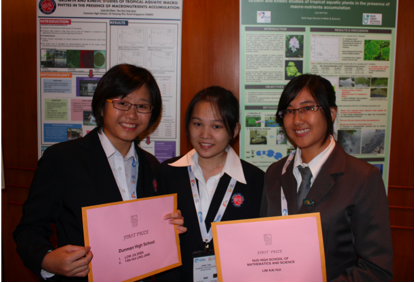
Winners of the Singapore Junior Water Prize 2010 with their winning reports behind them – (from left) Low Jia Zhen and Jane Tan Hui Ling from Dunman High School and Lim Kai Hui from NUS High School
By Koh Lee Mei Fanny
Tropical aquatic plants may possibly be the next big idea in desalination following winning reports at the Singapore Junior Water Prize 2010.
Focusing on the usage of tropical plants such as the water lattice and the water hyacinth, eutrophic ponds or in other words, water bodies with algae in them, may soon have a new lease of life following findings gleaned from this local competition.
Lim Kai Hui, 17, a year five student from NUS High School, clinched the top prize with her findings of how effective aquatic plants are in absorbing unwanted minerals in various water bodies.
“Phytoremediation (using plants in the desalination process) can be used as one of the initial processes of desalination. If we increase the usage of it in Singapore’s reservoirs and water reserves, we can actually cut down on the intensity of some of the other processes, such as reverse osmosis,” Kai Hui explained.
Hot on her heels were Low Jia Zhen, 17, and Jane Tan Hui Ling, 17, both year five students in Dunman High School, with them sharing the honour of first place with Kai Hui.
“Our research focused mainly on the strength of bonds between the enzymes in aquatic plants and minerals like nitrate and phosphate,” Jia Zhen stated.
“To put it simply, the stronger the bond between these enzymes and minerals, the better the plants can absorb the minerals which will help to clean the water much more effectively,” she further elaborated.
Every year, the top winners of the Singapore Junior Water Prize will make their way to Stockholm, Sweden to represent Singapore in the Stockholm Junior Water Prize. This year’s winners from Dunman High School and NUS High School will be combining their efforts before heading to the capital of Sweden for this once-in-a-lifetime opportunity where they will get to mingle with leaders and fellow candidates who share their passion for water-related topics during World Water Week.
According to Jane, “Our research actually helps to find out where the optimum locations are for aquatic plants to be planted in order to maximise the absorption rate of unwanted minerals,” which makes the pooling of research between both schools easier given the similar nature of their findings on tropical aquatic plants.
Support from their schools and a conducive environment helped them clinched their awards too, the winners agreed.
“Our school funds water research efforts by students such as the Singapore Junior Water Prize. We actually submitted a report on nanotechnology as well which won a gold for the poster design,” said Ms Serene Lam Non Har, 40, Subject Head for Science as well mentor to the Dunman High School team that won.
In fact, implementing aquatic plants in our water purification process may not be an impossible dream based on current fixtures that aid in the conservation of water.
Ms Mariam Mathew, 41, Course Manager of the Building & Environment Division for the School of Engineering from Ngee Ann Polytechnic, “Such fixtures are actually part of phytoremediation so they actually go hand-in-hand with the teams’ winning concepts.”
Mrs Grace Quah-Oon Gek Neo, Director of the Building & Environment (BE) Division under the School of Engineering in Ngee Ann Polytechnic, which co-organised the Singapore Junior Water Prize states, “It’s good that we have such competitions as it will help entice students to the area of water technology.”
The Singapore Junior Water Prize is an annual competition that strives to seek out research that helps to enhance the quality of lives through the improvement of water quality. It is open to youths from secondary schools, junior colleges, and institutes of technical education as well as polytechnics all over Singapore. The Lien Foundation has funded it since 2008 and they will continue to do so till 2013 due to their strong belief in sustainable projects and education for youths.
The Stockholm Junior Water Prize will be held from 4 September to 9 September in Stockholm, Sweden where the winner will walk away with USD$5,000.
Terms to know:
Eutrophic
Water that is rich in nutrients such as nitrogen and phosphorous
Eutrophication
Refers to the process of excessive plant growth in water that results in less oxygen being available thus causing plants to die and decay in water bodies
Phytoremediation
Refers to the usage of plants for on-the-spot remediation of groundwater
Reverse osmosis
Refers to the process by which a membrane is used to remove matter from water
